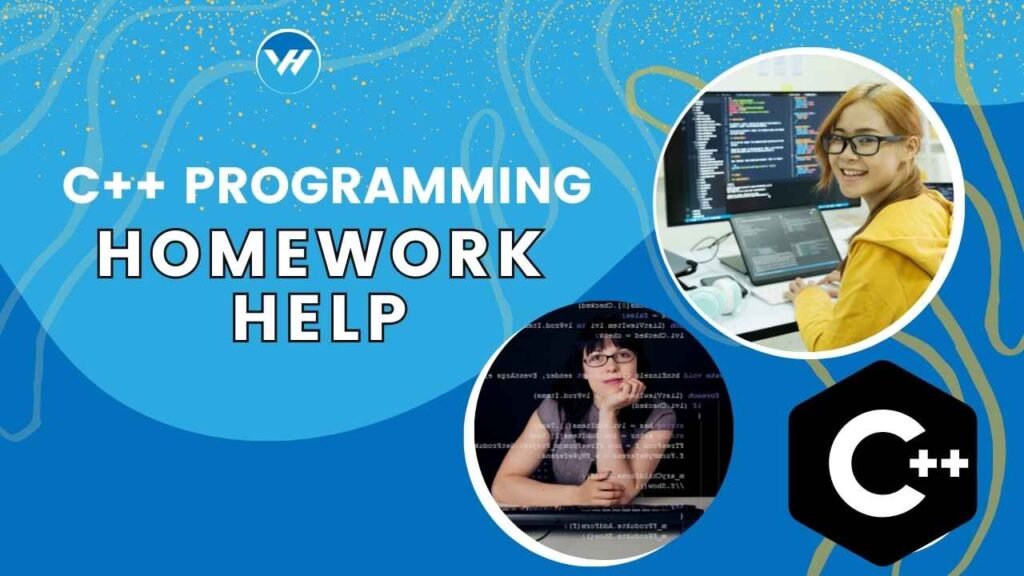C++ is a cornerstone in the world of programming, underpinning everything from game development to complex financial systems. Yet, despite its importance, many students find themselves struggling with C++ homework assignments.

The complexity of the language, combined with the pressure of academic deadlines, can make mastering C++ a daunting task. Fortunately, online tutoring platforms offer a lifeline, providing personalized assistance that can make a world of difference.
Table of Contents
ToggleUnderstanding C++ Basics
C++ is a powerful, high-performance language that’s used widely in various applications. To get started with C++, you need to understand its basic components:
- Variables and Data Types: These are the building blocks of any program. C++ supports various data types, including integers, floating-point numbers, and characters.
- Operators: Used to perform operations on variables and values. They include arithmetic, relational, logical, and bitwise operators.
- Control Structures: These include if-else statements, switch cases, and loops (for, while, do-while), which control the flow of the program.
Object-Oriented Programming in C++
One of C++’s standout features is its support for Object-Oriented Programming (OOP). Key concepts include:
- Classes and Objects: Classes are blueprints for creating objects. They encapsulate data and functions that manipulate that data.
- Inheritance: This allows a class to inherit attributes and methods from another class.
- Polymorphism: Enables functions to process objects differently based on their data type or class.
- Encapsulation: Bundling data with the methods that operate on that data.
- Abstraction: Hiding the complex implementation details and showing only the essential features.
Advanced C++ Topics
Once you’ve grasped the basics, it’s time to delve into more advanced topics:
- Pointers and References: Essential for memory management and dynamic memory allocation.
- Dynamic Memory Allocation: Using
newanddeleteto allocate and deallocate memory at runtime. - Templates and the Standard Template Library (STL): Provide a way to create generic and reusable code.
Common C++ Homework Assignments
C++ homework can range from simple coding problems to complex projects. Some common types include:
- Coding Problems: Solving specific problems using C++ syntax and logic.
- Projects: Larger assignments that might involve developing a complete application.
- Theory-Based Questions: These may involve explaining concepts or writing pseudo-code.
Benefits of Online C++ Homework Help
Online tutoring offers numerous benefits, such as:
- Personalized Assistance: Tailored help from experts who understand your unique challenges.
- Flexible Learning Schedule: Learn at your own pace and on your own schedule.
- Access to Resources: Utilize a wide range of tools and materials to enhance your understanding.
How to Choose the Right Online Tutor
When selecting an online C++ tutor, consider the following:
- Qualifications: Look for tutors with strong academic and professional backgrounds in C++.
- Experience: Tutors who have experience in both teaching and working with C++ are invaluable.
- Reviews: Feedback from other students can provide insights into a tutor’s effectiveness.
Features of a Good Online Tutoring Platform
A robust online tutoring platform should offer:
- Interactive Tools: Video calls, chat functions, and interactive whiteboards to facilitate learning.
- Assignment Submission: Easy ways to submit homework and receive feedback.
- Certified Tutors: Access to qualified and experienced tutors who can provide high-quality assistance.
Success Stories and Testimonials
Many students have turned their grades around with the help of online tutoring. Here are a few examples:
- Case Study 1: John, a computer science major, improved his C++ programming skills significantly after a semester of online tutoring.
- Case Study 2: Maria, struggling with her final project, received the guidance she needed to successfully complete it and ace her course.
Getting Started with Online Tutoring
Starting with online tutoring is straightforward:
- Register: Sign up on the platform and create your profile.
- Find a Tutor: Use the platform’s search feature to find a tutor that fits your needs.
- Schedule Sessions: Book sessions at times that work best for you.
Tips for Maximizing Online Tutoring Sessions
To get the most out of your sessions:
- Set Goals: Clearly define what you want to achieve in each session.
- Regular Practice: Practice problems regularly to reinforce what you learn.
- Seek Feedback: Actively seek and implement feedback from your tutor.
Balancing Self-Study and Tutoring
While tutoring is incredibly beneficial, self-study is equally important:
- Self-Study: Helps you reinforce concepts and practice coding on your own.
- Combining Both: Use tutoring to clarify doubts and self-study to practice and solidify your understanding.
Overcoming Common Challenges in C++
Common challenges in C++ include:
- Debugging Errors: Learn systematic debugging techniques to find and fix errors.
- Complex Concepts: Break down complex topics into manageable chunks.
- Time Management: Plan your study schedule to balance between assignments and practice.
Additional Resources for C++ Learners
There are numerous resources available to help you learn C++:
- Books: “The C++ Programming Language” by Bjarne Stroustrup.
- Online Courses: Platforms like Coursera and Udemy offer comprehensive C++ courses.
- Websites and Forums: Stack Overflow, GitHub, and dedicated C++ forums.
Conclusion
Online tutoring can be a game-changer for students struggling with C++. By providing personalized help, flexible learning schedules, and access to a wealth of resources, online tutors can help you master C++ and excel in your assignments. Remember, it’s important to seek help when you need it and to continually practice and apply what you learn.
FAQs
Q1: What is the best way to start learning C++? A1: Begin with understanding the basics, such as syntax, variables, and control structures. Online courses and tutorials can be very helpful.
Q2: How can online tutoring help me with my C++ projects? A2: Online tutors can provide personalized guidance, help you debug your code, and explain complex concepts, ensuring you understand and can apply them.
Q3: What should I look for in a good C++ tutor? A3: Look for tutors with strong qualifications, experience in both teaching and working with C++, and positive reviews from other students.
Q4: How do I submit my assignments on the tutoring platform? A4: Most platforms have a straightforward submission system where you can upload your assignments and receive feedback directly from your tutor.
Q5: Are there free resources available for learning C++? A5: Yes, there are many free resources available, including online tutorials, forums, and documentation, which can supplement your learning.





